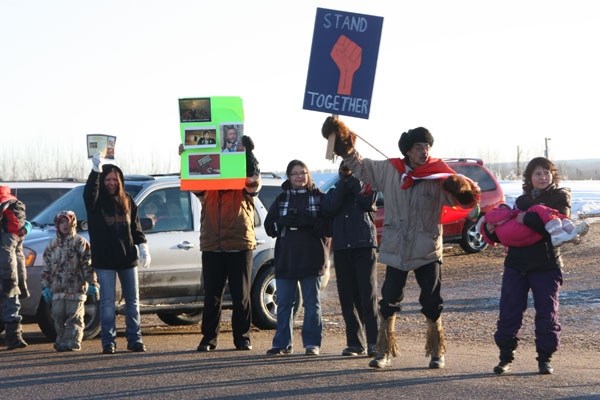A peaceful blockade was scheduled to take place in Frog Lake First Nations on Monday morning, as part of the countrywide movement, Idle No More, taken up by First Nations people to fight for their rights and specifically against federal Bill C-45, the Jobs and Growth Act.
“The bill that’s trying to be passed in the House of Commons is not acceptable to the Frog Lake First Nations, or native people throughout Canada,” said Carlos Quinney, a band member of Frog Lake, last week.
“They’re trying to pass legislation to relax environmental legislation, and that infringes on our treaty rights.” Quinney worried specifically about what he saw as the relaxation of federal protections on lakes and rivers and also voiced his displeasure that chiefs were not consulted on the bill.
Local chiefs were contacted by the Journal but were unable to be reached for response. However, Attawapiskat First Nations Chief Theresa Spence has launched a hunger strike until she gets a treaty meeting with Harper and has said, “I am willing to die for my people because the pain is too much and it's time for the government to realize what it's doing to us,” according to the Canadian Press.
Like the omnibus bill introduced this past spring, the 457 page budget implementation bill that was passed by the Senate last Friday includes several changes to many rules and regulations. Some of those changes include MP pension reform, extending hiring credits for small businesses, pay raises for judges, allocating $10 million for the National Research Council, and an increase in the amount of funds for the New Horizons program for seniors, which local MP Brian Storseth notes has been utilized in St. Paul before. He added the bill is important for “jobs, growth and prosperity.”
However, for First Nations groups, more contentious were changes to the Fisheries Act, the Navigable Waters Protection Act and the Indian Act. Storseth said it was important to address “actual individual concerns.” First, as a response to the concern about the lack of consultations, he said the government didn’t have to consult First Nations on things such as eliminating the penny or on shipping expenses for granaries. As for concerns that protections for thousands of lakes and rivers under federal law will be removed, he said, “That’s not actually true.”
The Navigable Waters Protection Act was put into place in 1882 and listed 17,000 waterways, he said, explaining, “If you can float a canoe in it in the spring, it’s navigable.” Instead of having municipal governments spend thousands of dollars on assessments and environmental applications, for instance, in putting in a culvert on a creek or stream that is dry nearly all year long, the municipality would now be able to address these issues without such measures, he said.
“In my summer consultations, this is one of the things the (County of St. Paul) actually asked me to deal with.”
Environmental assessments are still needed on major projects that affect waterways, such as oil and gas activities or major bridge building, he noted. “We have not reduced any environmental standards.” Instead, the bill streamlines the process that companies must go through in order to be approved under environmental assessments, instead of leaving them for months in uncertainty. “It is about reducing red tape, for a simple term.”
Changes have also been introduced to the designation of native reserve lands. One of those changes will enable First Nations reserves to collect property taxes from leases, and for First Nations corporations and businesses to lease reserve land, he said.
“You’re talking about acts that are 150 years old and need to be changed,” he said.
Storseth said he has only had a few emails and a Facebook comment or two on the subject. “I haven’t seen a huge outcry on this . . . I haven’t been contacted by First Nations chiefs in our area.”
Canadians have known about the budget for seven months now since the introduction of the spring omnibus bill, he added, giving plenty of time for people to have raised questions about it. Although he said he was happy to listen to people’s concerns, he noted, “At the end of the day, consultation doesn’t mean we have to do what First Nations tell us.”
Shannon Houle, a Saddle Lake band member who lives in Kehewin, says she is fasting for two days in solidarity with Chief Spence’s hunger strike. While she takes specific issues with Bill C-45, such as provisions for the sale of reserve land, the running of pipeline through reserve lands, and what she sees as weakening of environmental regulations, she says the issue is larger than the bill.
“The treaty agreement has not been respected from day one by the Canadian government,” she said. Many reserves are in crisis mode, with many people living in poverty and unemployed, without access to safe water and proper housing. “We’re tired of being silenced . . . enough is enough.”
Once the planet’s resources are used and depleted, they’ll be gone forever, she said, adding the bill affects more than just First Nations people, but all of Canada and further beyond. “We’re trying to wake up the rest of the world.”



